
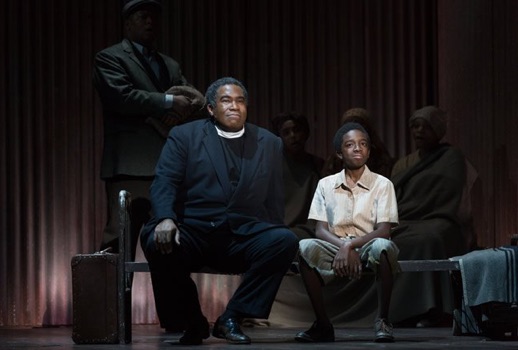
The story follows Stephen Kumalo, a simple, aging reverend in 1940s South Africa, who travels from his country village to bewildering Johannesburg only to discover that his son Absalom has killed the enlightened liberal son of a local landowner in a botched robbery attempt.
After Absalom is condemned to death, Stephen travels back to the village with Absalom’s pregnant wife Irina and his wayward sister’s son. Distraught and questioning his faith, Stephen finds unlikely compassion from the grieving landowner Jarvis, who, moved by his murdered son’s commitment to progress for black South Africans, commits himself to the village’s improvement.
Anderson makes a valiant effort to translate the bleak tragedy into something palatable for 1949 Broadway, but much of his book feels clumsy today. Transparent efforts to lighten the mood play as banal sitcom material, while new scenes providing additional backstory on key characters register as paint-by-numbers filler.
Even more problematic are Anderson’s efforts to universalize the novel’s specific focus on the ravages of colonial exploitation, instead emphasizing Jarvis’ journey to overcoming personal prejudice. Though the “white savior” deus ex machina ending is presented with considerable ambiguity in the book, the musical is more than happy to turn it into a tidy resolution.
Weill’s score (with lyrics by Anderson) fares much better. The use of the chorus and a narrator throughout to comment on the action, an innovation used previously in Weill’s own show Love Life and Rodgers and Hammerstein’s 1947 Allegro, is deployed here to great effect in sequences such as the pastoral opening which sets the first lines the novel, or the sequence in which the chorus reacts to news of the murder (which harbors inklings of the “City on Fire” chorus from Sweeney Todd 30 years later).
The high point for the chorus is the second act number “Cry, the Beloved Country” which powerfully weaves together wrenching scenes of Absalom’s marriage in prison and his final breakdown. Though there are less effective uses of the chorus too, such as the tiresome traveling sequence in the first act, one is left to wonder what a through-composed “Lost in the Stars” might have accomplished.
Against the epic trappings of the chorus, the solo music is a grab-bag. Weill and Anderson insert several more conventional Broadway numbers from previous shows that are pleasing enough, but feel conspicuously out of place. This includes the hit title song, written for an earlier (thankfully) aborted show called “Ulysses Africanus.” New songs run the gamut as well, from the exceedingly ill-advised “Who’ll Buy,” a brassy innuendo-laden dance number, to a pair of effective Porgy-ish arias for Irina. The biggest impression is made by Kumalo’s great soliloquy in Act II, a more somber cousin to the similar number for Billy Bigelow in “Carousel” a few years before.
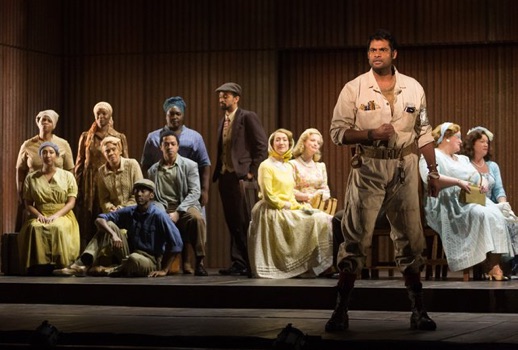
He is less successful with some of the the show’s other demands, overplaying Kumalo’s nervous energy in the straight scenes, but brings real pathos to the tragic climax. He should also probably be allowed to just park and bark for “Lost in the Stars,” instead of the current on-the-nose blocking which has him literally “lost” and careening around an empty stage.
Tenor Sean Pannikar, who made a strong impression in past WNO productions of Nabucco and Salome, lends a luxurious voice to the thankless narration role of the “Leader” here. Irina’s two numbers are handled beautifully by soprano Lauren Michelle, who manages to find an appropriate straighter Broadway style without sacrificing an imposing sound. The rest of the largely non-singing cast made the most of the book, including Wynn Harmon and Manu Kumasi as Jarvis and Absalom.
The production, originally created for Cape Town Opera, was previously seen at Glimmerglass in 2012 with Owens, Pannikar, and other cast members returning here. Director Tazewell Thompson, who wrangled “Appomattox” in the fall for WNO, has created a solid, natural staging, though one can’t help but feel that “Lost in the Stars,” with its myriad challenges, demands a more critical approach.
It is disheartening to imagine this frustrating but valuable artifact of mid-century musical theater living out its days occasionally trotted out in earnest, slightly dull opera house productions. An enterprising regietheater impresario could really have a field day here.
Michael Mitchell’s set, consisting of panels made to look like neatly distressed corrugated iron panels, mostly gets the job done, though flying pieces used to break up the more complicated sequences sometimes seem like more trouble than they are worth. If not particularly attractive, it probably travels well.
Photos: Karli Cadel














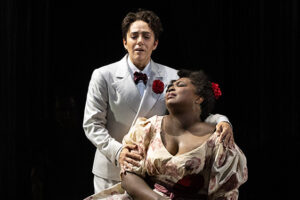
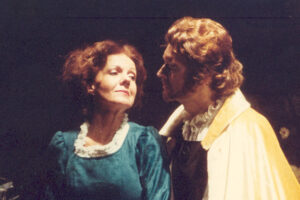
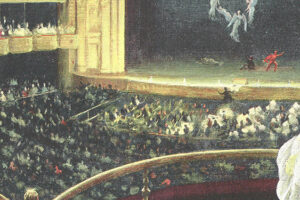
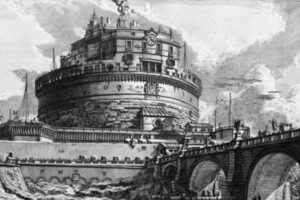






Comments